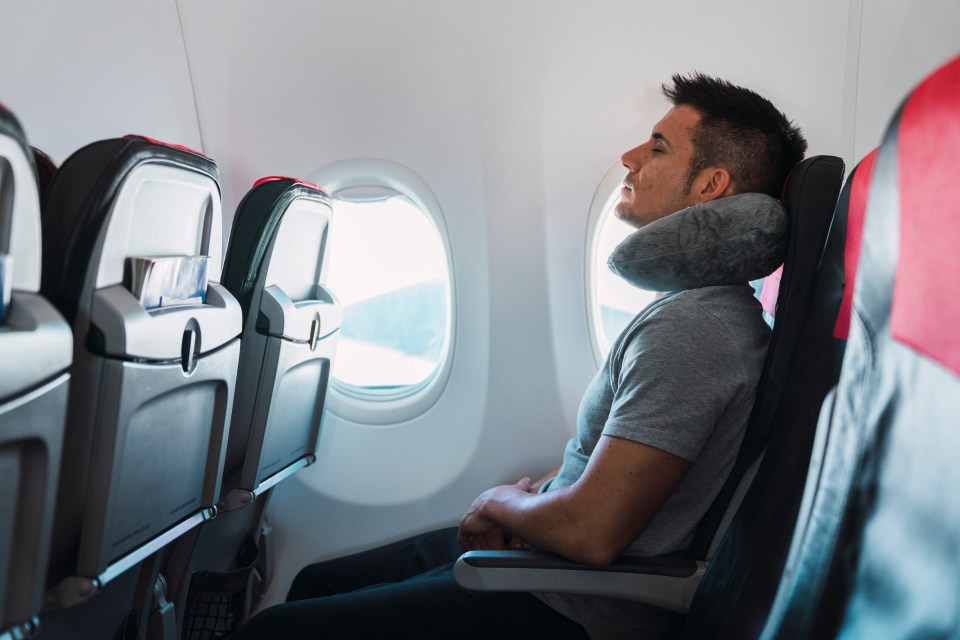A GUT doctor has revealed the reason why plane travel makes you feel bloated – but it isn’t your fault.
Getting on that plane to your next destination is always an exciting moment but many passengers often experience one particular problem.
GettyPlane travel can often make you feel bloated[/caption]
GettyExperts have revealed the best ways to ease the stress of needing to release some pressue[/caption]
A day of air travel can throw a wrench into the inner workings of your digestive system, causing gas, bloating and the need to release some pressure.
Those with irritable bowel syndrome, in particular, often suffer the most.
However, this process is perfectly normal, so there’s no need to panic when you begin to feel that tightness in your waistband after take off.
But understanding the causes of these symptoms can help you overcome them better in the future.
Dr. Melissa Hershman, a gastroenterologist at Oregon Health and Science University, revealed that the normal amount of gas in your stomach and intestines expands as cabin pressure drops.
This is similar to what happens to a bag of crisps or a plastic water bottle, Dr. Baha Moshiree, a gastroenterologist at Atrium Health Wake Forest in Charlotte, N.C., added.
“Being at high altitude also seems to slow down the muscle contractions that keep the contents of your digestive system moving,” Dr Moshiree told The New York Times.
“Experts don’t know why this happens”, she added.
Nonetheless, it’s one reason for feeling constipated on airplane travel days.
A sluggish gut can also allow more gas to build up.
Sitting for hours during a long flight doesn’t help, so Dr. Hershman suggests walking and doing other physical activity to help keep the gastrointestinal tract “moving along.”
Travel stress and anxiety can also worsen gas and bloating, said Megan Riehl, a gastrointestinal psychologist at Michigan Medicine.
However, you can’t change the altitude or air pressure of your plane, while there’s only so much movement you can do on your flight.
But if flying makes you gassy and bloated, experts have suggestions for your next trip.
“Watch what you eat. Starting the day before your departure, avoid foods that you know make you gassy,” said Tamara Duker Freuman, a dietitian in New York City who specialises in digestive conditions.
She urged passengers to avoid high FODMAP foods like beans, onions, garlic, wheat, certain nuts, dairy products and fruits.
Dr Freuman also said coffee is a no-go due to its bad reputation for being dehydrating.
Hydration is key for avoiding constipation, which can worsen gas and bloating, said Dr Moshiree.
She said bringing a refillable water bottle so that you can sip water throughout the day is the best way to avoid the issue.
Avoiding alcohol the day before and the day of travel, since it can be dehydrating, will also help.
Carbonated beverages can also increase gas symptoms but for some people, it may help them burp and therefore reduce gas buildup.
Dr Hershman has encouraged the use of medications and supplements as needed, with over-the-counter medication like Gas-X or Mylanta good to take before your flight
An alternative is to try an enzyme supplement like Beano or Fodzyme before eating, which may help reduce gas produced from digestion, she added.
Chewing gum is often used to ease ear discomfort while flying but it can also cause you to swallow more air.
That’s according to Dr Hershman, who told passengers to try skipping the gum or at least limit your chewing if you’re concerned about bloating.
But the best remedy for easing bloating and gas build-up is to move your body.
“Move your body. If you can, get up from your seat every hour or so,” Ms. Freuman said.
“Try to find some space to reach toward your toes, or twist your midsection from side to side.
“These movements can help the gas spread out in your gut rather than pooling in one spot,” she said.
Breathing techniques are another option.
“If you’re stuck in your seat, diaphragmatic breathing may help reduce stress and relax your gut,” Dr. Riehl said.
Passengers should take a four-second inhale through their nose, then exhale for six seconds through their mouth until you feel your belly fall.
If worst comes to worse, then “let it go.”
“If gas is causing pain or discomfort, holding it in will make you feel worse,” said Dr. Riehl. “It’s healthy to just let it out.”
“Trust me,” she said, “you’re not the only one farting on an airplane.”

